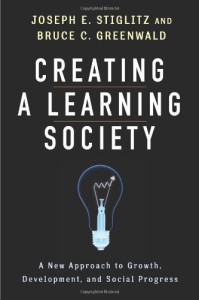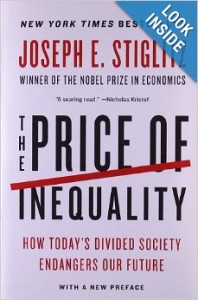
Joseph Stiglitz, Bruce Greenwald
4.0 out of 5 stars Glass Half Full — Cannot Be Ignored But Also Off the Rails, September 4, 2014
Among all economists in the English language, I hold Joseph Stiglitz to be among the most enlightened and virtuous. When I formed a “dream” coalition cabinet in 2012, he was on it. His co-author is of less interest to me — finance geeks have been demonstrably impotent these past fifty years — and particularly those who fall prey to mathematical formulas lacking in social integrity — and I believe with book would have been stronger had Stiglitz either gone it alone, or collaborated with an educator such as Derek Bok. The book is also rooted in old lectures, starting in 2008, and it is focused on Kenneth Arrow's work, which is best appreciated on its own merits. See, for example:
Moral Hazard in Health Insurance (Kenneth J. Arrow Lecture Series)
The Limits of Organization (Fels Lectures on Public Policy Analysis)
General Competitive Analysis, Volume 12 (Advanced Textbooks in Economics)
The weakest point of this book, which does indeed have much to offer for anyone who cares about the future of academia, commerce, governance, and society, is that is “assumes” integrity on the part of the government, and that industrial policies are somehow going to corrupt deep ethical and intellectual failings across all major forms of organization (academia, civil society, commerce, government, law enforcement, media, military, and non-governmental/non-profit). This is the same mistake made by Limits to Growth: The 30-Year Update and the Club of Rome. The *losing* alternative to the Limits to Growth assumption that top-down government would deal responsibly with climate change and other high level threats focused instead on education from the bottom up — the central point of Will Durant's 1919 doctoral thesis, now available as Philosophy and the Social Problem: The Annotated Edition.



